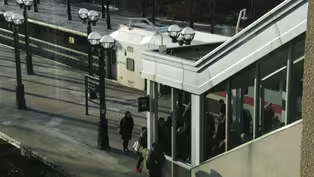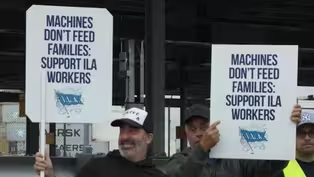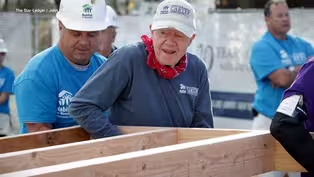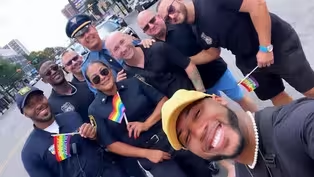NJ Spotlight News
NJ Spotlight News: January 9, 2025
1/9/2025 | 26m 46sVideo has Closed Captions
Watch as the NJ Spotlight News team breaks down today’s top stories.
We bring you what’s relevant and important in New Jersey news and our insight. Watch as the NJ Spotlight News team breaks down today’s top stories.
Problems playing video? | Closed Captioning Feedback
Problems playing video? | Closed Captioning Feedback
NJ Spotlight News is a local public television program presented by THIRTEEN PBS
NJ Spotlight News
NJ Spotlight News: January 9, 2025
1/9/2025 | 26m 46sVideo has Closed Captions
We bring you what’s relevant and important in New Jersey news and our insight. Watch as the NJ Spotlight News team breaks down today’s top stories.
Problems playing video? | Closed Captioning Feedback
How to Watch NJ Spotlight News
NJ Spotlight News is available to stream on pbs.org and the free PBS App, available on iPhone, Apple TV, Android TV, Android smartphones, Amazon Fire TV, Amazon Fire Tablet, Roku, Samsung Smart TV, and Vizio.
Providing Support for PBS.org
Learn Moreabout PBS online sponsorship>> Funding for New Jersey Spotlight News is provided by New Jersey Education Association, making public schools great for every child.
RWJBarnabas Health, let's be healthy together.
And Orstead.
Anchor: Tonight, strike averted.
Longshoremen and shipping companies work in agreement to stave off a work shortage days before a deadline that could cripple the economy.
And commuters sound off on congestion pricing.
>> Traveling back home during rush hour.
Anchor: And creating LGBTQ+ liaisons between law enforcement and the community.
>> We want to make sure every person in New Jersey gets treated with the same respect as everybody else.
Anchor: And remembering Jimmy Carter.
The Former President laid to rest as residents of New Jersey reflect.
>> He was a humble man and it was interesting to work with a man who was president of the United States.
Anchor: NJ Spotlight News begins right now.
♪ >> From NJPBS Studios, this is "NJ Spotlight News" with Briana Vannozzi.
Anchor: Thank you for joining us on this Thursday night.
We begin with a few of today's top headlines.
A second U.S. port strike has been averted after dockworkers, the ports and shipping companies reached a tentative deal on a new contract late Wednesday.
The six-year agreement still needs to be ratified by union members but in a joint statement, the international Longshoremen's Association into their employer called it a win-win.
Exact details are not being disclosed.
The agreement according to a statement protects union jobs and creates a framework for when and how automatic machinery is used at the ports.
That was the thorniest issue that needed to be hammered out.
Management had argued ports needed to introduce technology to up -- improve productivity.
President Biden praised the deal.
The strike would have taken effect January 6 -- 15th days before President elect Trump's inauguration, and could have crippled the economy.
Ports will remain open and operated until the current contract is ratified.
Also tonight, new statistics from New Jersey state police revealed traffic jet -- deaths jumped 14% in 2024.
According to data, 691 people were killed in 654 traffic accidents throughout last year, that's 85 more people and killed in similar incidents in 2023.
New Jersey also hit a 30 year high for pedestrian fatalities which means the state missed two goals it set in a highway safety plan to reduce both last year.
The only bright spot in what was otherwise grim data is that slightly fewer bicyclists were killed last year, 25 compared to 27 the year prior.
Smart growth America, which helps communities plan saver development, says towns need to develop what they call complete streets.
Infrastructure for all users, drivers, walkers and bicycles.
Other solutions include putting more money into people getting out of their cars and onto mass transit.
Growing concerns tonight about the threat of bird flu across the country and New Jersey is in high alert.
State Fish and wildlife officials said the disease caused the deaths of 11 wild birds, mostly snow geese but also Canadian geese and hawks.
More animals from South Jersey are being tested.
There are no confirmed detections of the virus in cattle.
Or in wildlife, mammals or commercial poultry flocks, which are highly susceptible.
A man from Louisiana died from bird flu earlier this week.
That's the first known human death in the U.S.. State officials are urging the public to be cautious, especially hunters and other people who encounter wildlife.
Transportation experts say it could take several weeks or months to learn the true impact of congestion pricing but commuters throughout the state say they are seeing the difference.
Many told us trains are packed and seats are filled.
The frigid start to the week isn't helping.
There been plenty of service disruptions to frustrate even the most seasoned mass transit rider, begging the question as to whether New Jersey's public transportation system will be able to keep up.
Brenda Flanagan reports.
>> Much more crowded trains and buses.
The trains are packed.
There is no seating at all.
Reporter: Frank Barker catches and NJ transit train in Ridgewood and thinks congestion pricing has had an impact on his commute from Hoboken to downtown New York City and he's not the only one.
>> Traveling back home through rush-hour is crowded, you stand up, like a can of sardines.
Reporter: On social media, riders posted pictures of cramped cards.
Never seen cars so packed, they say.
And this one, standing room only and packed in tightly, thumbs up, way to go.
Extreme cold and some snow did impact mass transit and four days of data do not make a trend but advocates say something is happening.
>> Anecdotally it does seem more people are taking New Jersey transit and they are right to be concerned about New Jersey transit service but New Jersey transit's problems existed before congestion pricing.
>> People are ditching their cars, personal vehicles and getting on the trains and people are noticing trains are more crowded.
Which is the point of congestion pricing.
Reporter: The NTA cited a spike in subway ridership and bus ridership rose as well.
Street traffic is not moving appreciably faster but.
>> In the streets I'm seeing less cars.
>> In the city it seems a little less traffic.
>> It's only a few days and I don't want to draw conclusions but I've gotten reports that New Jersey transit trains, that they are overflowing.
Reporter: New Jersey says it is still reviewing.
>> What is a reasonable number was or what I'm paying if we get medication and actual real dollars into projects that matter for Jersey commuters?
Reporter: His take on the significant drop in traffic at Hudson River crossings this week, people are working from home.
>> We are not sure because we need the data but I think in New York is be careful what you wish for reality.
People are saying we will work from New Jersey.
>> Governor Murphy spent all of last year suing New York and he could've been using that time to beef up New Jersey transit or helping expand service.
>> It's hard to tell whether New Jersey transit is ready for the influx in commuters and that's part of the problem.
New Jersey transit tends to be unreliable.
Reporter: So how will they handle a shift in commuters to trains and buses?
The agency says they haven't seen a notable increase in riders this week but added we will continue to monitor for changes in commuting patterns and it is also important to note that prior to congestion pricing, many NJ transit trains and buses during peak periods were already at or above pre-pandemic levels.
This conductor agrees.
>> Our trains had already been really packed.
Ridership has gone up, especially the evening rush-hour trains.
>> I would love to hear from New Jersey losers -- New Jersey leaders about how transit stays reliable and trustworthy for riders.
Reporter: A new corporate tax did save NJ transit from a physical cliff and it is still struggling after enduring two so-called summers of Hell.
Riders hope they will adjust to congestion.
Anchor: Today marked a national day of mourning for former President Jimmy Carter, who died last week at the age of 100.
His state funeral was held this morning at the national cathedral in Washington, where he was eulogized by President Biden.
Also family members and close friends gave personal memories and reflections on Carter's legacy as leader of the free world and extensive work after.
Every living Former President attended the ceremony.
Artist casket was flown to his hometown of Plains, Georgia, for a second funeral at the Baptist Church where he taught Sunday school.
He is being buried at his home alongside former First Lady Roslyn Carter.
President Carter left memories around the world including in Union Beach, where he and Rosalind joined at Habitat for Humanity effort to help rebuild the Jersey shore in the aftermath of hurricane Sandy, work there was also remembered today.
Ted Goldberg reports.
>> What inexperience.
Reporter: It's been more than 11 years since Jimmy Carter helped Union Beach rebuild after Superstorm Sandy.
Memories of that day still fresh for volunteers who worked with him.
>> It was amazing.
What a lovely man.
And Rosalyn, oh my goodness, her priority was if children had a safe home to live in, they would excel in education and that was her priority.
>> President Carter was a wonderful man.
He was humanitarian and he helped a lot of people.
Reporter: James and Nancy were among the 200 or so volunteers who joined President Carter in rebuilding this home, one of many destroyed in Union Beach.
Carter had just turned 89 so some volunteers were curious how hard he would work.
>> He walks around with a hammer and scarf.
Reporter: Habitat for Humanity helped over 20 families in building homes are doing critical repairs and a lot of that work was in Union Beach.
>> The town was shut down because they were afraid of looters.
It was devastating.
>> It's unbelievable at happened to the people that lived there with the flooding and wind damage and everything else.
You felt sorry for them and had to do something to help them.
>> To help you is part of our life and we are grateful you let us come and join you.
Reporter: After following security protocols -- >> We had to go through all these things.
Reporter: The Former President went to work with his hammer and scarf.
Reporter: We were at Union Beach and he showed up with his wife and I couldn't believe how anxious he was to start working and he worked a solid three hours without help.
>> I was shocked.
Rosalyn was a little frail but she stayed at the worksite with him, but boy could he swing a hammer.
I said to my husband, he swings that big heavy hammer.
>> There was a real sense of community and getting people back into their homes as quickly as possible.
Reporter: Elmer, who lives in the house Carter helped to build, said "resident Carter's work with habitat has given so many families like ours a fresh start and a place to call home.
His dedication and compassion helped restore hope and dignity to my father.
>> He most certainly contributed to by think the response of the volunteer community.
Reporter: Carter was president four years and spent larger -- longer than that as an ambassador for Habitat for Humanity.
>> We cross the divide and touch the hearts and lives, it gives you self-respect and hope and dreams of people who have never had a decent house, and habitat is the best way to cross the divide easily because you meet families in need.
On an equal basis, swinging a hammer or making boxes or whatever it does during the day and you learn to respect them as equals to you.
Reporter: His legacy as a humanitarian may be more than a president is still felt by those here.
>> He was such a humble man and it was so interesting to work with a man who was a president of the United States.
>> He spoke with volunteers and the first thing he said is I've got to go because I have to get back because I teach Sunday school at the Baptist Church and Georgia.
This man was a president and he's doing all these wonderful things and caring about people.
Reporter: I'm Ted Goldberg.
>> Thank you and God bless you all.
Reporter: NJ Spotlight News.
Anchor: As college students across the state wrap up winter break, and hand full of top universities in the U.S., including in New Jersey, are urging international students to return before Inauguration Day.
That's two ensure they are back on campus before any potential travel bans go into effect.
This is as they prepare for changes.
President elect Trump has promised to make changes to immigration policy once he takes office.
While the specifics of his plan are unclear, our child and education writer has learned many schools are still proceeding with caution.
Hannah joins me with more details.
What schools did you talk to and which in New Jersey are warning students this could be a hazard to them.
Reporter: A lot of New Jersey's schools are starting after Inauguration Day.
These schools are warning students that you should pay attention to the news, pay attention to changes and think about that when you are making travel plans.
There is a university that starts generate 22nd, told students to plan to be back by the 20th just in case to make sure they are traveling with important documents.
Other schools like Kinston are offering personalized advice.
They set up virtual Q&A's with an immigration attorney.
Anchor: Does New Jersey have a large international student body, and it doesn't drew?
Reporter: Last year, more than 23,000 international students, which is a decent amount.
And there are maybe 5000 in schools with the biggest population like Rutgers.
Anchor: What kind of supports, what do these Q&A's look like, I imagine these are students and/or their families, inquiring about how the school can help them if they get stuck in travel limbo.
Reporter: It's hard for schools to offer that much guidance and for students to make these decisions because we don't know exactly what Trump is going to do when he takes office, so the best thing schools are saying is if you can be back, maybe try to be back or don't go away for a break or travel with your passport, and leave a buffer of a few days to make sure you get back.
Anchor: Does having a Visa guarantee you can get back into the country, that you are rightfully here as a student, there's no guarantee?
Reporter: It's not guaranteed, college students come in on visas that basically let them get to a port of entry in the U.S. so they can get to the airport at Newark or Philly or wherever it may be.
It doesn't mean immigration agents at the airport will let them into the country.
Anchor: I wonder how many students went home for winter break and how many opted to stay on campus or with friends in New Jersey.
Any indication of that?
Reporter: Hard to say but a lot of schools keep housing over break for students that can't go home.
Anchor: Which countries of origin are the students from?
We will remind folks when Trump took office in 2017, and his first week he had this executive order travel bans and they were from Muslim countries if I remember correctly, seven of them.
Are these students worried their countries may be targeted for travel bans?
Where are they from in particular?
Reporter: Most international students in New Jersey come from India and China, about two thirds.
Not that many students from the countries targeted last time but some experts are warning that India and China could be included in bands the next term Trump Excel office and they could be more severe or include more countries.
Without an indication of what will happen I think a lot of students and colleges are on edge.
Anchor: How concerned are they?
What are they telling you or are they just waiting to see if and what the president does?
Reporter: It seems like people are waiting and working individually with students, it seems like colleges are afraid to put a target on their back I a big statement, making out and raising alarms about this.
So must colleges are offering to help students individually.
Anchor: That make sense, to not call more attention.
I'm thinking also about students that would have an internship or something abroad, study abroad.
What happens to those plants?
Reporter: Some students that are international students picking about a summer abroad that I've spoken to, common in a junior year, are reconsidering.
Would they be able to get back in the country next August or September?
It's hard to say.
Anchor: TBD on that.
You can find Hannah's reporting on her website.
Thank you for coming in.
People in Trenton and surrounding towns are being urged to conserve water.
The waterworks put out an advisory to ask customers to use water only for essential reasons or emergencies.
They say this is needed because of frazzled ice buildup in the Delaware River.
That is a collection of small eyes crystals that collect when temperatures drop below freezing and is notorious for blocking water intake, and can shut down operations.
The city says there's plenty of safe drinking water thanks in part to the Pennington Avenue reservoir, designed to store 100 million gallons of treated water or a three-day supply for the system.
There's also emergency interconnection with the new by New Jersey American water that's been activated while the city works to bring the water plant back online.
Finally tonight, Jersey City trying to bridge the divide between law enforcement and the LGBTQ+ community by appointing one of the city's police officers to serve as a new liaison, with the city advocating for advocacy and respect.
The new liaison will be charged with educating the public and fellow officers about bias incidents and how to handle them.
With an end goal of changing police culture.
>> We want to make sure every person in New Jersey gets treated with the same respect as everybody else.
Reporter: That's how this retired state police Captain approached his policing efforts before retiring but he and his off-duty partner says not everyone feels that sense of respect from the police.
>> The LGBTQ community doesn't necessarily trust law enforcement for many different reasons.
Reporter: They are both openly gay officers and both came out when it wasn't well received.
In 2016 they came together to confront mistrust between LGBTQ folks and police with the help of Garden State equality.
>> LGBTQ individuals and the law enforcement community have a long, troubled history dating all the way back to 1969 at the Stonewall riots in prior.
>> It's our job in my opinion as police to make sure we reject that and make sure every person that identifies as LGBTQ, they can feel comfortable going to the police, either as a witness to a crime or a victim to a crime, and no they will be respected.
Reporter: Too often many don't come forward so they connected with two LGBTQ police liaisons from Jersey City and Newark, these are outwardly facing law enforcement movers that identify as LGBTQ.
Together they started an initiative to encourage more departments across the state to great liaison roles.
This detective heard about it at a private event a few years ago and said it felt like the right step for him.
>> I didn't realize the need in the community until I got involved and until I got to meet some of the residents of the town that said I don't think you understand how big this is that you are representing the community that we have to communicate and connect with law enforcement.
>> We are up to 140 representatives across the state and continually growing.
>> We have in excess of 10 liaisons, Department of Corrections has multiple liaisons.
Reporter: As they grow they stay true to four key goals, rebuild trust by engaging with the community to let them know liaisons are there, recruit LGBTQ individuals to join the rinks of law enforcement or take on the role in their current department, create a support network for other LGBTQ police officers, and train new and existing officers on how to interact with the LGBTQ community.
>> This has allowed me to train both new and veteran police officers on how to deal with members of the LGBTQ community.
Topics such as -- which come easy to me but not for everyone -- preferred pronouns, gender identity, sexual orientation.
These are conversations I'm allowed to have with members of my department that they necessarily wouldn't have.
Now when they deal with members of the community, they have a better understanding when they are dealing with victims.
Reporter: How does this work change the culture and Police Department across estate that perhaps haven't been as understanding or responsive to the LGBTQ community?
>> We have found it to be extremely effective and I think law enforcement agencies are moving in the right direction.
They are recognizing the importance of diversity.
>> These are changemakers because they are changing perceptions and helping to improve the culture both in the profession and as law-enforcement professionals, engage with local communities.
>> It helps promote a safer city and safer environment for us and the community we police.
Reporter: They are asking anyone who wants to become a liaison to reach out and into new the change in their own community.
I am Joanna Gagis.
Anchor: That will do it for us tonight but to and into Reporters Roundtable tomorrow with David Cruz, he will kick off the first show of the new year by talking to the founding director of the school of Public and global affairs at Fairleigh Dickinson University.
They will talk about Governor Murphy's upcoming state of the state address and what to expect in his final year in office.
Then, a panel of local reporters break down this week's big political headlines.
That's tomorrow afternoon on the NJ Spotlight News YouTube channel.
For the entire team, thank you for bring with us, have a great night and we will see you tomorrow.
>> NJM insurance group Serving , the needs of businesses and residents for more than 100 years.
And by the PSEG foundation.
Orstead believes that clean energy as a way to create stronger economies and communities.
Together, our projects will provide American wind powered energy for New Yorkers and support jobs, education and the local supply chain.
Orstead, committed to a clean energy future for New York.
♪
Commuters say more on trains as congestion pricing kicks in
Video has Closed Captions
Clip: 1/9/2025 | 4m 43s | NJ Transit riders have posted photos showing crammed trains (4m 43s)
Longshoremen reach last-minute deal to avoid strike
Video has Closed Captions
Clip: 1/9/2025 | 1m 10s | In key issue of automation, exact details of the deal aren't disclosed yet (1m 10s)
Trenton urged to conserve water due to ice problems
Video has Closed Captions
Clip: 1/9/2025 | 1m 8s | Icy conditions on Delaware River hinder water supply (1m 8s)
Volunteers share memories of President Jimmy Carter
Video has Closed Captions
Clip: 1/9/2025 | 5m 4s | In 2013, the former president helped to rebuild a home destroyed by Superstorm Sandy (5m 4s)
Working to improve LGBTQ-police relationships
Video has Closed Captions
Clip: 1/9/2025 | 4m 44s | The NJ LGBTQ Law Enforcement Liaison Program tries to foster better relations (4m 44s)
Providing Support for PBS.org
Learn Moreabout PBS online sponsorship
- News and Public Affairs

Top journalists deliver compelling original analysis of the hour's headlines.

- News and Public Affairs

FRONTLINE is investigative journalism that questions, explains and changes our world.












Support for PBS provided by:
NJ Spotlight News is a local public television program presented by THIRTEEN PBS




